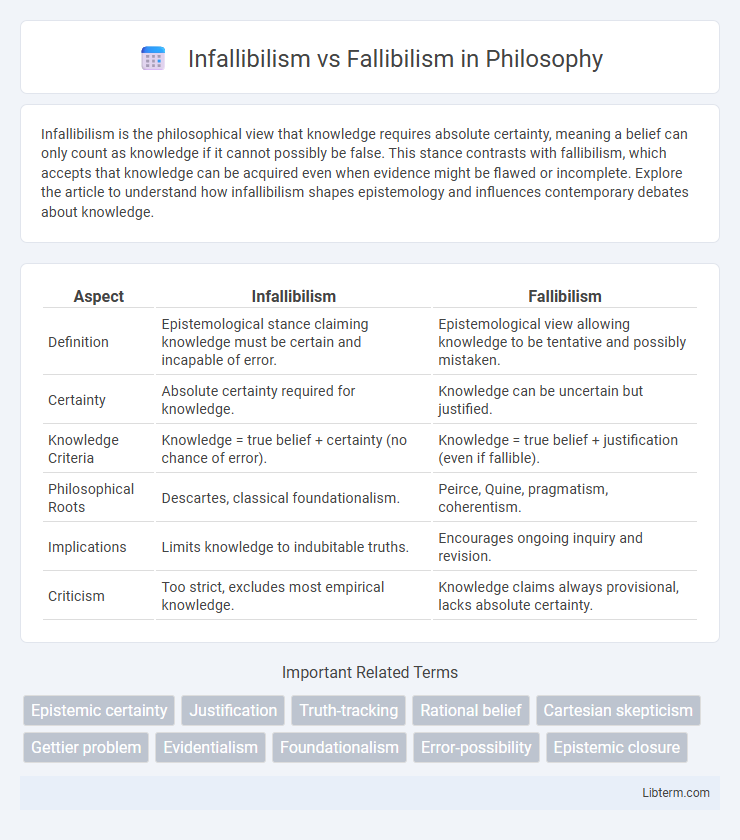Infallibilism is the philosophical view that knowledge requires absolute certainty, meaning a belief can only count as knowledge if it cannot possibly be false. This stance contrasts with fallibilism, which accepts that knowledge can be acquired even when evidence might be flawed or incomplete. Explore the article to understand how infallibilism shapes epistemology and influences contemporary debates about knowledge.
Table of Comparison
| Aspect | Infallibilism | Fallibilism |
|---|---|---|
| Definition | Epistemological stance claiming knowledge must be certain and incapable of error. | Epistemological view allowing knowledge to be tentative and possibly mistaken. |
| Certainty | Absolute certainty required for knowledge. | Knowledge can be uncertain but justified. |
| Knowledge Criteria | Knowledge = true belief + certainty (no chance of error). | Knowledge = true belief + justification (even if fallible). |
| Philosophical Roots | Descartes, classical foundationalism. | Peirce, Quine, pragmatism, coherentism. |
| Implications | Limits knowledge to indubitable truths. | Encourages ongoing inquiry and revision. |
| Criticism | Too strict, excludes most empirical knowledge. | Knowledge claims always provisional, lacks absolute certainty. |
Understanding Infallibilism: Definition and Core Concepts
Infallibilism is the epistemological position that knowledge requires absolute certainty, meaning that for a belief to count as knowledge, it must be immune to any possibility of error. This concept emphasizes that knowledge claims must be conclusively justified, leaving no room for doubt or revision. Infallibilism contrasts sharply with fallibilism, which accepts that knowledge can be justified even if it is not certain, allowing for the possibility of error and correction.
Exploring Fallibilism: Meaning and Philosophical Roots
Fallibilism asserts that human knowledge is inherently uncertain and subject to revision, emphasizing the possibility of error in all empirical and theoretical claims. Rooted in the philosophy of Charles Sanders Peirce and later expanded by thinkers like Karl Popper, Fallibilism challenges the notion of absolute certainty upheld by Infallibilism. This perspective encourages continuous inquiry and critical examination, recognizing that knowledge evolves through the correction of mistakes and new evidence.
Historical Development of Knowledge Theories
Infallibilism, rooted in classical philosophy, asserts that knowledge requires absolute certainty, with origins traceable to Descartes' foundationalism emphasizing indubitable beliefs. Fallibilism emerged prominently in the 19th and 20th centuries through thinkers like Charles Sanders Peirce and Karl Popper, who argued that knowledge is provisional and subject to revision based on empirical evidence and rational critique. The historical development of these theories reflects a transition from seeking immutable truths to embracing a dynamic, evolving understanding of knowledge grounded in ongoing inquiry and falsifiability.
Key Differences Between Infallibilism and Fallibilism
Infallibilism asserts that knowledge requires certainty and cannot be subject to error, while fallibilism accepts that knowledge can be provisional and fallible despite justification. Infallibilism demands absolute proof for knowledge claims, contrasting with fallibilism's allowance for probable and revisable beliefs based on evidence. The core difference lies in infallibilism's skepticism of human cognitive limitations versus fallibilism's recognition of knowledge as an evolving, corrigible process.
Major Philosophers and Their Positions
Infallibilism, supported by philosophers such as Rene Descartes and G. E. Moore, asserts that knowledge requires absolute certainty and that true beliefs cannot be mistaken. Fallibilism, championed by thinkers like Karl Popper and Charles Sanders Peirce, argues that knowledge is inherently uncertain and that beliefs are always subject to revision based on new evidence. These diverging epistemological positions influence debates on the nature of knowledge, justification, and belief formation in classical and contemporary philosophy.
Infallibilism: Strengths and Criticisms
Infallibilism asserts that knowledge requires absolute certainty, reinforcing the strength of epistemic justification by eliminating doubt and fostering unwavering confidence in beliefs. This strict criterion strengthens foundations in fields like mathematics and formal logic, where certainty is crucial for validating knowledge claims. Critics argue infallibilism is impractical in everyday contexts since few, if any, beliefs can achieve absolute certainty, leading to potential skepticism and limiting the scope of what can be known.
Fallibilism: Strengths and Potential Weaknesses
Fallibilism asserts that human knowledge is inherently uncertain and subject to revision, fostering continuous inquiry and adaptation in scientific and philosophical domains. Its strength lies in promoting intellectual humility and openness to new evidence, which enhances the robustness of knowledge systems. However, fallibilism's potential weakness includes the risk of excessive skepticism, which may undermine confidence in well-established truths and impede decisive action.
Practical Implications for Epistemology
Infallibilism demands absolute certainty for knowledge claims, which often limits practical inquiry and stifles cognitive progress due to its rigid standards. Fallibilism, embracing the possibility of error, supports a dynamic epistemological framework that encourages continuous questioning and revision of beliefs, enhancing adaptability in knowledge acquisition. This pragmatic flexibility of fallibilism underpins scientific methodologies and everyday reasoning, highlighting its value in effective epistemic practices.
Infallibilism vs Fallibilism in Contemporary Debates
In contemporary debates, infallibilism asserts that knowledge requires absolute certainty and that any possibility of error disqualifies a belief from being knowledge, while fallibilism maintains that knowledge can tolerate some degree of uncertainty and error. Philosophers such as Alvin Goldman and Ernest Sosa have explored how fallibilism aligns with scientific inquiry and epistemic humility, contrasting with infallibilism's rigid standards. The debate centers on the practicality of knowledge claims, with fallibilism dominating discussions in epistemology due to its accommodation of real-world evidence and cognitive limitations.
Which Stance Prevails? Conclusion and Future Perspectives
Infallibilism and fallibilism remain central to epistemological debates, with fallibilism prevailing in contemporary philosophy due to its acknowledgment of human cognitive limitations and the provisional nature of knowledge. Empirical sciences and epistemic practices increasingly favor fallibilism because it allows for error correction and continuous improvement of beliefs. Future perspectives emphasize integrating cognitive science findings to refine fallibilist models, potentially bridging gaps with infallibilist ideals through advanced epistemic technologies.
Infallibilism Infographic

 libterm.com
libterm.com